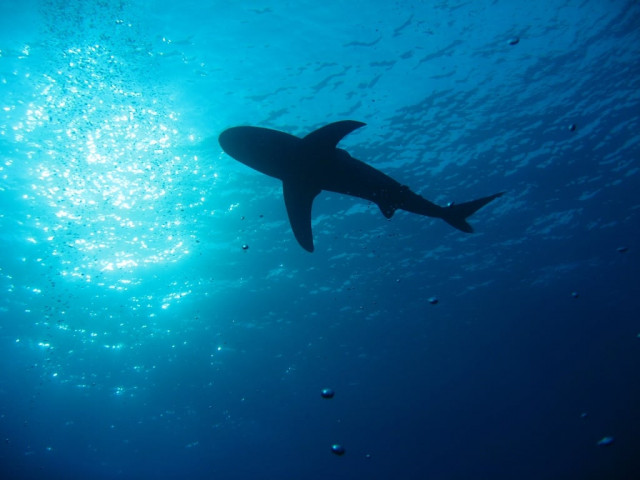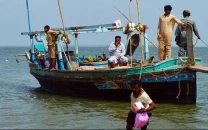Speakers suggest shark fishing ban to address decreasing numbers
144 shark species are found in Pakistani waters.

The World Wide Fund for Nature-Pakistan (WWF-Pakistan), in collaboration with the Marine Fisheries Department, arranged a one-day international workshop on 'Conservation and Management of Shark Fisheries in Pakistan' at the Marriot Hotel on Monday.
The workshop was inaugurated by Republic of the Maldives Minister for Fisheries and Agriculture Dr Mohamed Shainee, who urged participants to follow the footsteps of the Maldives whose coastal waters and Exclusive Economic Zone have been declared a shark sanctuary.

"Shark fishing is completely banned in the Maldives in order to recover the declining population of sharks due to uncontrolled fishing methods," said Shainee. He suggested that all stakeholders, including the relevant government departments and representatives of non-governmental organisations, should sit together for the development of a National Plan of Action (NPOA) regarding conservation and management of sharks in Pakistan.
Discussing the history of shark fishing, Muhammad Moazzam Khan - former director-general of Marine Fisheries Department and WWF-Pakistan technical advisor - said that there are records that shark fishing existed in Karachi as long as 150 years ago.
According to Khan, 50,000 tonnes of fins and meat were being exported from Pakistan annually in 1980; now, the figure is down to just 5,000 tonnes due to the decrease in shark population. "It shows how rapidly we have lost sharks," he said.
Khan said that there are 144 shark species in Pakistan, adding that a few of them are endemic but their status is unknown. He said that the biology of about 35 species is regularly studied and there is an immediate need to declare at least some of the area as a shark sanctuary along the coast.
"The recent decline in catches indicates an alarming trend which needs to be addressed," WWF-Pakistan director Rab Nawaz pointed out, adding that sharks form an important part of Pakistani fisheries and are mainly caught unintentionally as a bycatch. Nawaz added that international assistance should be sought for the study and development of an NPOA for shark conservation.
"Shark meat is consumed locally. Its skin is dried and used in poultry feed, which is in high demand," said marine expert Naeem Ashraf Raja. "We do not have the exact figures of Pakistan's shark trade."
Coordinator for the Indian Ocean Tuna Fisheries, Umair Shahid, said that there is an urgent need to collect data on the population of sharks in Pakistani waters. He also emphasised that sharks may be caught for research purposes but not for commercial use.
Hussain Sinan, of the Maldives Fisheries and Agriculture Ministry, discussed the ban on shark fishing in the Maldives and its impact on tourism. He claimed that shark population is increasing due to the ban in his country, adding that the same needs to be done in Pakistan.
WWF-Pakistan senior director Dr Ejaz Ahmad pointed out that WWF-Pakistan had started working on sharks in 2006 and has been involved in its monitoring ever since. "Many countries have successfully implemented an NPOA for sharks, but in certain shark-fishing countries like Pakistan, such an NPOA has not been prepared yet."
Marine Fisheries Department director-general Shoukat Hussain talked about fishing trends in Pakistan. "Shark is an important fishing commodity but its catch is decreasing due to overfishing," he said. "The government is aware of the need for the development of an NPOA and a draft is being prepared."
Published in The Express Tribune, September 17th, 2014.



















COMMENTS
Comments are moderated and generally will be posted if they are on-topic and not abusive.
For more information, please see our Comments FAQ